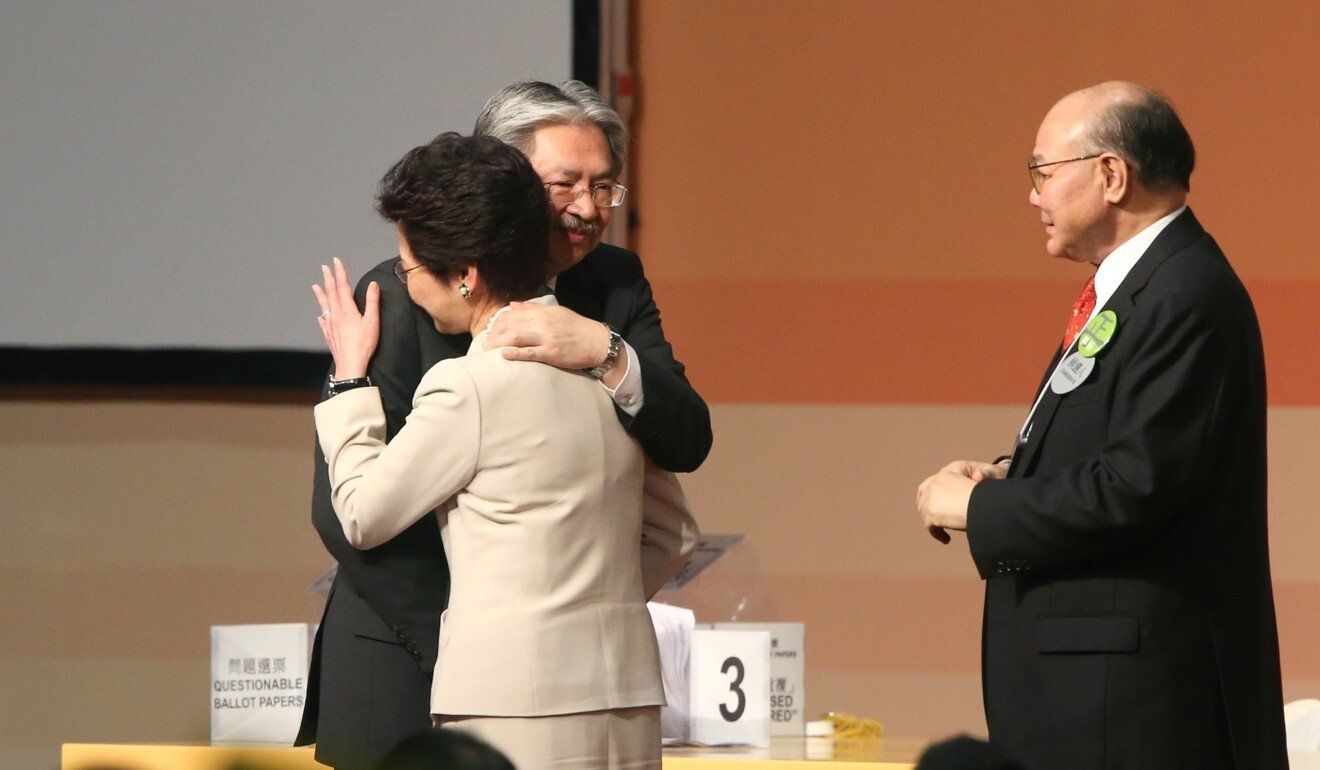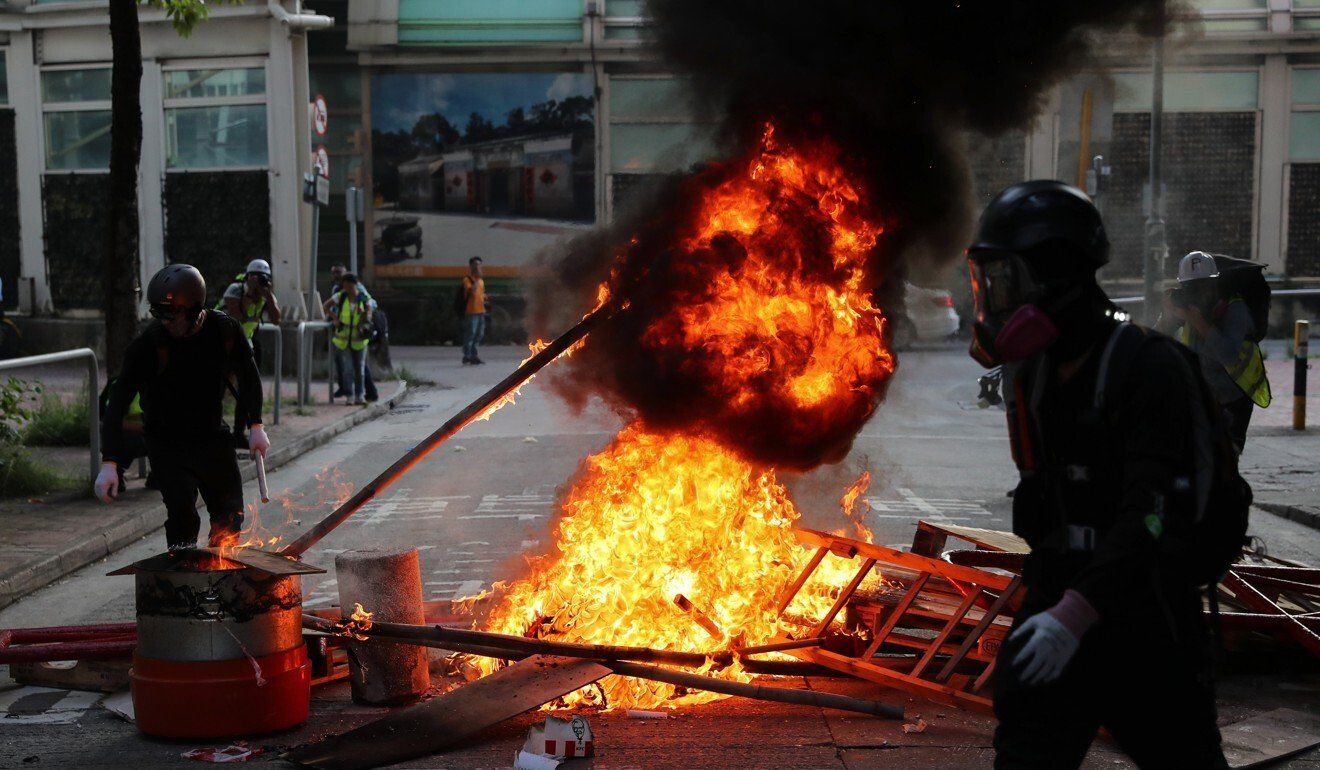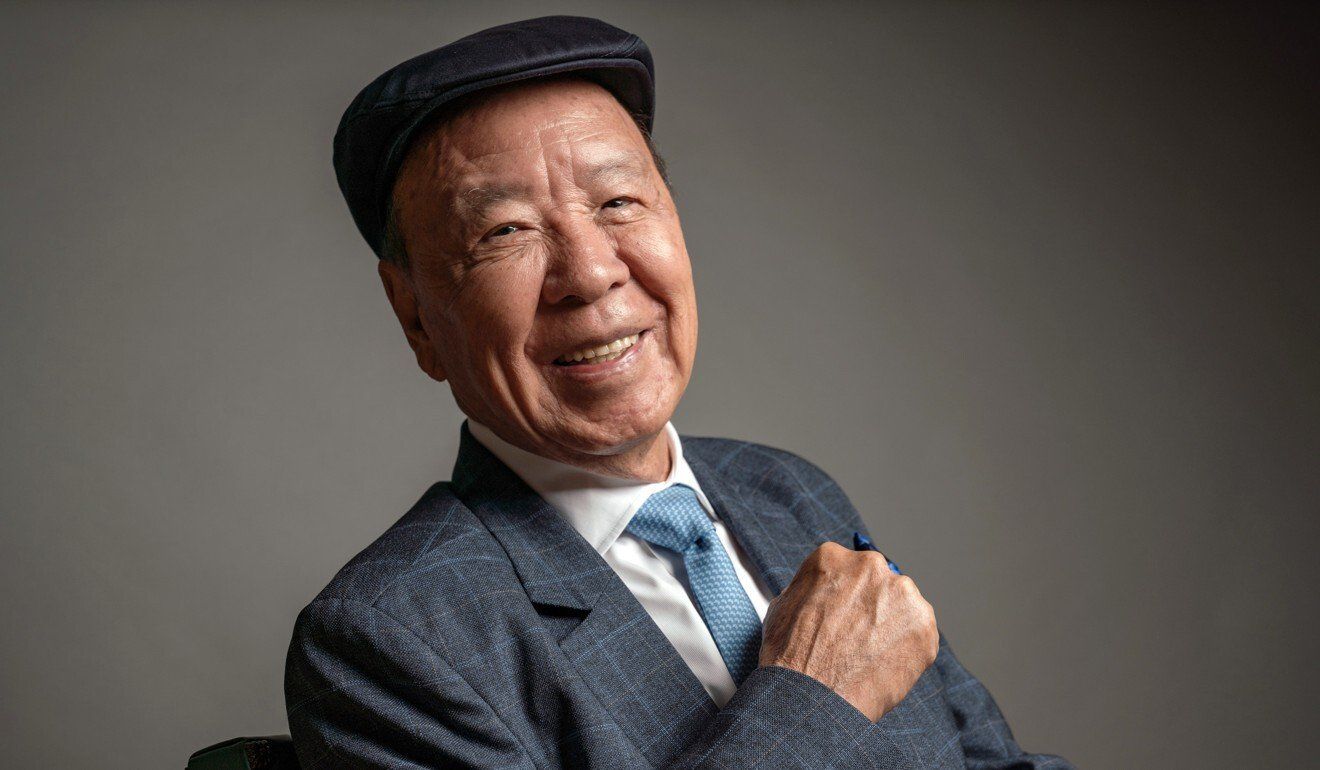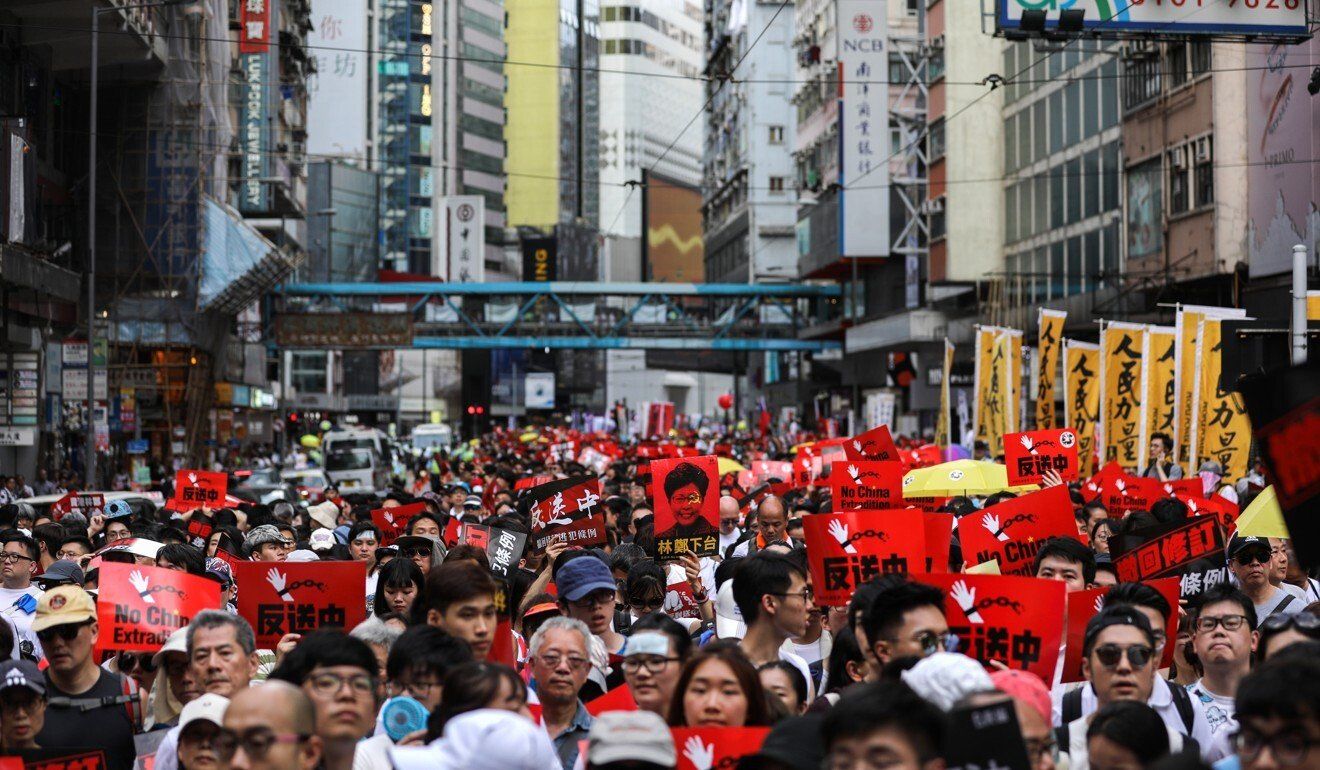Hong Kong News

Will Hong Kong tycoons have their political wings clipped under electoral reforms?
When Hong Kong’s former financial secretary John Tsang Chun-wah stepped forward as a candidate for the city’s chief executive race in 2017, some local property developers supported him.
But his most ardent backers knew even before the votes were cast that he would lose to former chief secretary Carrie Lam Cheng Yuet-ngor, Beijing’s preferred choice.
Derek Yuen Mi-chang, one of Tsang’s campaign members, recalled that despite talk that Beijing did not support the ex-finance chief, quite a number in the exclusive Election Committee that would pick the winner favoured him initially.
 Carrie Lam hugs her opponent John Tsang after winning the chief executive election in 2017.
Carrie Lam hugs her opponent John Tsang after winning the chief executive election in 2017.
“But soon after Lam declared she would be running, you could see some of these voters, especially heavyweight politicians and tycoons, publicly switching to support her,” Yuen said. “The central government’s directive was what mattered and most of these committee members took their cue from that.”
In the end, Tsang managed to garner 365 votes against Lam’s 777 out of 1,163 valid ballots cast, and retired judge Woo Kwok-hing limped in with just 21.
The 2017 race was considered by many as the most competitive yet for the leader’s job since Hong Kong returned to Chinese rule in 1997, and the role played by the city’s property tycoons in the contest was evident yet again.
This select group of billionaires had long been regarded as “kingmakers” with sufficient clout in the Election Committee to ensure that Beijing’s preferred candidate would win convincingly.
Some noted, however, that in 2017 not all were as compliant as might have been expected. Already miffed by the group, Beijing’s impatience had appeared to only grow since then, and especially after the anti-government protests of 2019.
Now their days as kingmakers seem to be numbered. Analysts believe that Beijing’s tightening grip over Hong Kong’s affairs includes imminent reforms to the make-up of the 1,200-strong Election Committee.
So far, the attention has been on the removal of the 117 district council seats from the committee, which are set to go into opposition hands, making Beijing upset that its preferred candidate would likely not secure these votes, in turn weakening their chances of victory.
Moreover, most of the district councillors were protesters in the forefront of the anti-government, anti-Beijing demonstrations of 2019. Under the mantra of “patriots governing Hong Kong”, they would not be acceptable to Beijing.
A pro-establishment source said: “Beijing has to make sure the electoral committee system for the coming chief executive election is foolproof.” This was why the removal of the 117 seats and changes to those controlled by private developers too could be vulnerable, he said. “The central government would like to avoid accidents from happening.”
A source close to Beijing confirmed the central government was considering reducing the influence wielded by the tycoons, their families and business associates.
‘Beijing unsure of Hong Kong establishment’
The extent of the property tycoons’ influence can be seen in their direct and indirect representation on the Election Committee, whose members include the business elite, professionals, unionists and politicians, as well as representatives from 17 subsectors of the economy.
Hong Kong’s 3.8 million registered voters have no direct say in choosing the chief executive.
The property scene is dominated by four families, each running a sprawling conglomerate involved in everything from housing to transport, retail, shopping malls, telecommunications and utilities.
Li Ka-shing’s CK Asset Holdings, the Lees of Henderson Land Development, the Kwoks of Sun Hung Kai Properties (SHKP), and the Chengs of New World Development are all represented strongly on the committee.
Research by the Post found that the 1,194-strong committee which selected the chief executive in 2017 included 96 members connected directly to the developers and their business associates, nearly half of whom came from just six developers.
And that figure did not include members with indirect, less obvious connections. If representatives from the subsectors – ranging from textiles to hotels, insurance, aviation, general finance and financial services – were included, tycoons in fact controlled 300 votes.
Beijing was keen to change this, analysts and sources said.
 Anti-government protesters set fire to a barricade used to block a road in Tuen Mun in September 2019.
Anti-government protesters set fire to a barricade used to block a road in Tuen Mun in September 2019.
Former transport and housing minister Anthony Cheung Bing-leung said that in the wake of the social unrest of 2019, Beijing began questioning the ability of three major segments of Hong Kong’s establishment – its governing team, the business sector and the pro-establishment camp.
“To Beijing, the political crisis in 2019 was tantamount to rebellion against the central government,” he said. “Some mainland officials and the pro-establishment camp blamed the opposition for causing trouble, but Beijing also has to ask if there is a problem with the ability and even loyalty of these key segments of the establishment.”
The current state of affairs reflects how much has changed in the relationship between Beijing and Hong Kong’s wealthiest families over the decades before and after the handover.
The central government initially regarded the tycoons as allies and relied on them to ensure Hong Kong’s continued stability and success, enabling them to thrive and vastly expand their business empires, but cracks began to show in more recent years.
In 2014, during the pro-democracy Occupy protests that shut down parts of Hong Kong for 79 days, the tycoons were blasted by Beijing media for keeping silent and not stating their views on the protesters’ demands.
Only then did the billionaires speak up, stressing the need for stability to ensure Hong Kong’s continued prosperity.
The strain resurfaced in the middle of 2019, when protests against a bill which would have allowed the extradition of fugitives to mainland China evolved into a massive anti-government, anti-Beijing movement.
Not a single tycoon spoke up during the first two months of the demonstrations, and they remained silent even after clashes between protesters and police turned violent. It was not until August that, one by one, they began condemning the chaos and violence.
 Lui Che-woo supported former chief secretary Henry Tang during his unsuccessful election bid in 2012. Photo: Bloomberg.
Lui Che-woo supported former chief secretary Henry Tang during his unsuccessful election bid in 2012. Photo: Bloomberg.
On the mainland, Hong Kong’s high property prices were deemed a key reason for the protests. The city’s property tycoons found themselves under fire again, as Chinese state media slammed them for sitting on massive land banks while Hongkongers could ill afford homes.
At a meeting in Shenzhen over the weekend between the city’s elites and Xia Baolong, Beijing’s top official on Hong Kong affairs, sources said the issue of unaffordable housing again cropped up, suggesting this was a concern of the central government.
Noting the change in the relationship over the years with the city’s tycoons, Cheung said: “The central government may have realised the need to revamp and strengthen the establishment in Hong Kong.”
But while Beijing might want to review Hong Kong’s political and social situation, he said it could not afford to abandon its long-time allies, including the business sector.
“Beijing’s long-standing thinking was that capitalists should enjoy a dominant position in Hong Kong after the handover as the city was a capitalist society,” he said. “That’s why the design of Hong Kong’s political system is tilted in favour of the business community.”
Shake up the Election Committee?
Lau Siu-kai, vice-president of the semi-official Chinese Association of Hong Kong and Macau Studies, suggested that the central government took note when some developers backed John Tsang for city leader in 2017, like some opposition lawmakers on the Election Committee who voted for him.
Leading real estate representative Thomas Jefferson Wu, son of Hopewell Holdings founder Gordon Wu Ying-sheung, nominated Tsang although it was reported that he eventually voted for Lam.
In the 2012 election, Li Ka-shing told the media he backed former chief secretary Henry Tang Ying-yen despite knowing the ex-official would not win.
Leung Chun-ying won that election, although Tang proved popular in the business sector and was supported by tycoons including Lui Che-woo of K Wah Group and David Li Kwok-po, chairman of the Bank of East Asia.
Lau said: “It won’t be surprising if some of the seats dominated by developers are removed in the near future, as the central government has to make sure the committee is filled with patriots and the future chief executive can win with a majority of votes.”
He added that unlike in the past when Beijing regarded the tycoons as allies, it was now trying to balance different interests in Hong Kong society and hoping to solve social inequalities.
It might help to show Hongkongers that it did not favour the big developers.
“The new generation of younger tycoons might not be as well accepted by the central government as their predecessors either,” Lau added.
The source close to Beijing said there was also concern that Hong Kong’s new generation of younger tycoons no longer shared the spirit of patriotism that their elders displayed when China reformed and opened up its economy from the late 1970s.
While it was not yet known how the Election Committee would be reformed, the source said discussions were already under way to reduce the votes allocated to tycoons and their families.
‘Anything is possible now’
Speaking on condition of anonymity, a second-generation property magnate in his 40s said that after the 2019 social unrest, he was not surprised that Beijing wanted to stop tycoons from being “kingmakers” in the Election Committee.
As a result of the months of protests and violence, he felt the Beijing and local administrations had lost trust in Hong Kong society as a whole.
“The protesters and the opposition camp simply crossed the line, opening a Pandora’s box. The far-reaching implication is that Beijing is now also sceptical about decisions by local business leaders,” he said.
“But I don’t think [Beijing] sees us as threats. They still need reliable, impactful allies … It just takes time to rebuild the broken trust.”
 Protesters march from Causeway Bay to government headquarters in Admiralty.
Protesters march from Causeway Bay to government headquarters in Admiralty.
A senior executive in the property sector, who also preferred to remain anonymous, said he did not know if Beijing planned to reduce the influence of big businesses in the Election Committee, but added: “It’s clear that Beijing desires political stability.”
Ridding the Election Committee of pan-democrats was one way to increase the predictability of elections to a large extent, he said. “But if you want even more certainty, it makes sense to clear out those you perceive to be unreliable,” he added.
Noting that Beijing was empowered to amend Annex 1 of the Basic Law, the city’s mini-constitution, to create or remove subsectors in the Election Committee, the senior executive said: “Anything is possible now and the business community has not fully realised it yet.”
Seemingly oblivious to the mood in Beijing, some second-generation tycoons have continued pouring resources into setting up social media platforms and engaging young influencers to be on their side and back their agenda, the Post has learned.
Several platforms are expected to be launched later this year, with the aim of boosting these young wealthy figures’ own standing and influence ahead of next year’s election for chief executive.
“Most content won’t be political, but with their own channels, they hope to make their own voices louder in key political timing, regarding policy issues and potential candidates,” said an insider familiar with a news platform backed financially by a tycoon leading a conglomerate.
Tycoons keen to win the hearts of supporters in Hong Kong and Beijing have also begun charities. Sino Group’s Daryl Ng Win-kong started the Greater Bay Area Homeland Youth Community Foundation in 2019, while New World Development’s Adrian Cheng Chi-kong founded the K11 Art Foundation last year.
“It’s not just about showing goodwill to society, but also about building networks with local young talents to make themselves more influential,” the insider said.
Another second-generation tycoon who spoke on condition of anonymity did not think Beijing would be in a hurry to change the status quo when it came to the property developers.
It was not as if they were not doing their part to try to bridge the divisions in society, he said. They were active with their charities and collaborating on housing for low-income residents, he added.
Beijing already had a lot on its plate politically, he continued, and the developers had always shown they understood national goals. “Plus, they don’t usually have super surprise announcements during two sessions.”
Tam Yiu-chung, Hong Kong’s sole delegate to the National People’s Congress Standing Committee, said changes to the Election Committee could happen soon, but declined to add to speculation.
All he would say was that Beijing still attached some importance to Hong Kong’s band of super-wealthy developers.
“The business sector, more or less, will always have some seats in the Election Committee, as Beijing knows Hong Kong is shaped by the capitalist system,” he said.











